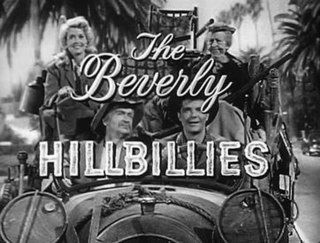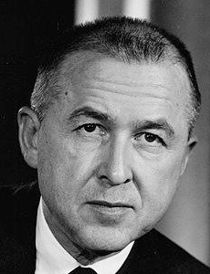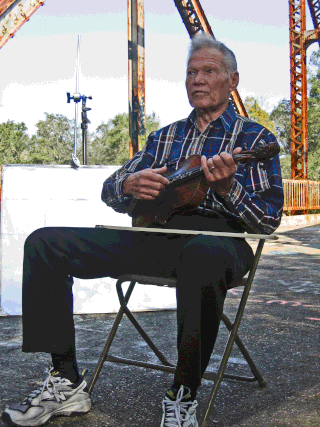
The Beverly Hillbillies is an American television sitcom that was broadcast on CBS from 1962 to 1971. It had an ensemble cast featuring Buddy Ebsen, Irene Ryan, Donna Douglas, and Max Baer Jr. as the Clampetts, a poor backwoods family from the Ozark Mountains of Missouri who move to posh Beverly Hills, California after striking oil on their land. The show was produced by Filmways and was created by Paul Henning. It was followed by two other Henning-inspired "country cousin" series on CBS: Petticoat Junction and its spin-off Green Acres, which reversed the rags-to-riches, country-to-city model of The Beverly Hillbillies.

William Smith Monroe was an American mandolinist, singer, and songwriter, and created the bluegrass music genre. Because of this, he is often called the "Father of Bluegrass".

Bluegrass music is a genre of American roots music that developed in the 1940s in the Appalachian region of the United States. The genre derives its name from the band Bill Monroe and the Blue Grass Boys. Like mainstream country music, it largely developed out of old-time music, though in contrast to country, it is traditionally played exclusively on acoustic instruments and also kept its roots in traditional English, Scottish and Irish ballads and dance tunes, as well as incorporating blues and jazz. It was further developed by musicians who played with Monroe, including 5-string banjo player Earl Scruggs and guitarist Lester Flatt. Monroe characterized the genre as "Scottish bagpipes and ole-time fiddlin'. It's a part of Methodist, Holiness and Baptist traditions. It's blues and jazz, and it has a high lonesome sound."

Lester Raymond Flatt was an American bluegrass guitarist and mandolinist, best known for his collaboration with banjo picker Earl Scruggs in the duo Flatt and Scruggs.

Earl Eugene Scruggs was an American musician noted for popularizing a three-finger banjo picking style, now called "Scruggs style", which is a defining characteristic of bluegrass music. His three-finger style of playing was radically different from the traditional way the five-string banjo had previously been played. This new style of playing became popular and elevated the banjo from its previous role as a background rhythm instrument to featured solo status. He popularized the instrument across several genres of music.

Scruggs style is the most common style of playing the banjo in bluegrass music. It is a fingerpicking method, also known as three-finger style. It is named after Earl Scruggs, whose innovative approach and technical mastery of the instrument have influenced generations of bluegrass banjoists ever since he was first recorded in 1946. It contrasts with earlier styles such as minstrel, classic, or parlor style, clawhammer/frailing/two-finger style, jazz styles played with a plectrum, and more modern styles such as Keith/melodic/chromatic/arpa style and single-string/Reno style. The influence of Scruggs is so pervasive that even bluegrass players such as Bill Keith and Don Reno, who are credited with developing these latter styles, typically work out of the Scruggs style much of the time.

"Foggy Mountain Breakdown" is a bluegrass instrumental, in the common "breakdown" format, written by Earl Scruggs and first recorded on December 11, 1949, by the bluegrass artists Flatt & Scruggs and the Foggy Mountain Boys. It is a standard in the bluegrass repertoire. The 1949 recording features Scruggs playing a five-string banjo.
Jerry Scoggins was an American country/western singer, guitarist, and band leader. He performed on radio, in movies, and on television from the 1930s thru the 1980s. He was noted for his work with Gene Autry and Bing Crosby and especially for singing "The Ballad of Jed Clampett", the theme song to the 1960s sitcom The Beverly Hillbillies.

Paul William Henning was an American TV producer and screenwriter. Most famous for creating the television sitcom The Beverly Hillbillies, he was also crucial in developing the "rural" comedies Petticoat Junction (1963–1970) and Green Acres (1965–1971) for CBS.

The Beverly Hillbillies is a 1993 American comedy film directed by Penelope Spheeris, written by Lawrence Konner and Mark Rosenthal, and starring Jim Varney, Diedrich Bader, Dabney Coleman, Erika Eleniak, Cloris Leachman, Rob Schneider, Lea Thompson and Lily Tomlin.

Live Art is the fifth album released by Béla Fleck and the Flecktones and their first non-studio album. It was recorded live at various concerts between 1992 and 1996 and features ten guest musicians.

Little Worlds is the tenth album by Béla Fleck and the Flecktones, released in 2003. The album was released as a 3-disc set. Ten tracks from the set were also released on a single disc called Ten from Little Worlds.

Flatt and Scruggs were an American bluegrass duo. Singer and guitarist Lester Flatt and banjo player Earl Scruggs, both of whom had been members of Bill Monroe's band, the Bluegrass Boys, from 1945 to 1948, formed the duo in 1948. Flatt and Scruggs are viewed by music historians as one of the premier bluegrass groups in the history of the genre.

Vassar Carlton Clements was an American jazz, swing, and bluegrass fiddler. Clements has been dubbed the Father of Hillbilly Jazz, an improvisational style that blends and borrows from swing, hot jazz, and bluegrass along with roots also in country and other musical traditions. He was posthumously inducted into the International Bluegrass Music Hall of Fame in 2018.

"Money for Nothing/Beverly Hillbillies*" is a song by "Weird Al" Yankovic. It is a cover of "Money for Nothing" by Dire Straits with the lyrics replaced by those of The Beverly Hillbillies theme song. The music video, which appeared as part of Yankovic's film UHF, is a parody of the "Money for Nothing" music video.
"Darlin' Cory" is a well-known American folk song about love, loss, and moonshine. It is similar in theme to "Little Maggie" and "The Gambling Man" but is not considered the same as those songs.
DeWitt "Snuffy" Jenkins was an American old time banjo player and an early proponent of the three-finger banjo style.
Return of the Beverly Hillbillies is a 1981 American made-for-television comedy film based on the 1962–1971 sitcom The Beverly Hillbillies which reunited original cast members Buddy Ebsen, Donna Douglas and Nancy Kulp reprising their characters of Jed Clampett, Elly May Clampett and Jane Hathaway, along with newcomers Werner Klemperer as C.D. Medford, Ray Young as Jethro Bodine and Imogene Coca as Granny's 100-year-old mother; original cast members Irene Ryan (Granny) and Raymond Bailey had died in 1973 and 1980 respectively, and Max Baer Jr. declined to participate.
Paul Warren was an American fiddle player best known for his work on a number of Kitty Wells singles, and his long tenure with Flatt and Scruggs and the Foggy Mountain Boys.













